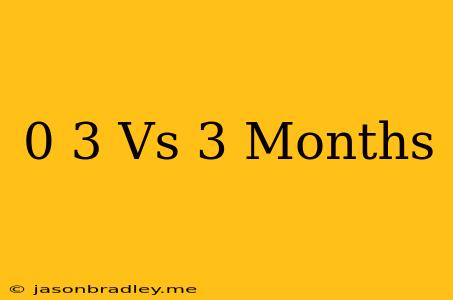The 0-3 Month vs 3 Month Mark: A Developmental Milestone Guide
The first few months of a baby's life are a whirlwind of growth and development. It can be overwhelming for new parents, trying to keep up with every milestone and change. Two major benchmarks stand out: 0-3 months and 3 months. While these periods overlap, there are distinct developmental differences that parents should be aware of.
0-3 Months: The Foundation of Development
This initial stage is all about establishing the building blocks for future growth. Babies are primarily focused on:
- Sensory Exploration: They are fascinated by sights, sounds, textures, and even smells. Their focus is short, but they are learning to process these stimuli.
- Basic Motor Skills: Newborns are learning to control their head, limbs, and eventually, their hands. They are also developing their grasp reflex and exploring the world through touch.
- Social and Emotional Development: This period is about building trust and connection with caregivers. Babies start to recognize familiar faces and voices, and they are comforted by physical touch.
3 Months: The First Major Leap
At this point, your baby has gained a significant amount of strength and coordination. This leads to exciting new developments:
- Increased Social Engagement: Babies at 3 months are more responsive to people and their interactions. They may start to coo and gurgle, attempting to communicate. They also enjoy watching faces and may even start to imitate simple facial expressions.
- Improved Motor Skills: They can now hold their head steady, roll over, and even start to reach for objects. Their hand-eye coordination is developing, and they are gaining better control of their limbs.
- Developing Senses: Their vision is getting sharper, allowing them to see objects from further away. They may start to show an interest in toys and explore their environment with their hands and mouth.
Key Differences to Watch For:
- Sleeping: Newborns sleep for a significant portion of the day, often in short bursts. By 3 months, babies typically sleep for longer stretches and have more predictable sleep patterns.
- Feeding: Newborns feed frequently, sometimes every 1-2 hours. By 3 months, babies may start to feed less often, and their feeding times may become more predictable.
- Movement: Newborns are primarily focused on reflex movements. At 3 months, they start to show more intentional movements, like rolling over and reaching for objects.
A Note to Parents:
Remember that every baby develops at their own pace. While the above milestones provide a general guideline, it's essential not to compare your baby to others. If you have any concerns, don't hesitate to consult your pediatrician.
These early months are crucial for your baby's development. By understanding the key differences between 0-3 months and 3 months, you can better appreciate your baby's progress and provide them with the necessary support and stimulation they need to thrive.
